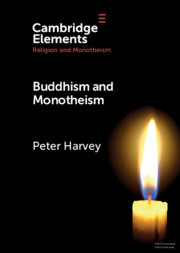Buddhism and Monotheism Elements in Religion and Monotheism Series
Langue : Anglais
Auteur : Harvey Peter

Explores ideas on monotheism in Buddhism, along with overlaps in Buddhist and monotheist ideas and practices.
Buddhism is a religion lacking the idea of a unique creator God. It is a kind of trans-polytheism that accepts many long-lived gods, but sees ultimate reality, Nirvana, as beyond these. It does, though, see Dhamma/Dharma as a Basic Pattern encompassing everything, with karma as a law-like principle ensuring that good and bad actions have appropriate natural results. This Element explores these ideas, along with overlaps in Buddhist and monotheist ideas and practices, the development of more theist-like ideas in Mah?y?na Buddhism, Buddhist critiques of the idea of a creator God, and some contemporary Buddhist views and appreciations of monotheisms.
1. The Indian religious context of the arising and development of Buddhism; 2. The different traditions of Buddhism; 3. The historical Buddha, and past Buddhas; 4. Rebirth; 5. Karma; 6. Suffering, its causes and its transcending; 7. Pessimistic?; 8. Buddhist ethics; 9. Buddhist practices; 10. Buddhist meditation and Christian contemplation; 11. The cosmos at large; 12. The realms of rebirth; 13. Māra, the Satan-like deadly one; 14. How Buddhists see and relate to the Gods; 15. Comparisons to monotheistic views on the Heavens; 16. The Buddhist 'creation' and 'fall' story; 17. Buddhism on the supposed Creator-God Great Brahmā; 18. The lovingkindness and compassion Of Great Brahmā; 19. The Dhamma as the basic pattern structuring the world; 20. Dhamma … and God; 21. A person as a flowing dance of conditioned, impermanent, self-less processes; 22. God as 'I am who I am'; 23. Nirvana … and God; 24. The nature of the Buddha in the Theravāda; 25. Faith and prayer in Theravāda Buddhism; 26. Bodhisattvas in the Mahāyāna; 27. Buddhas in the Mahāyāna; 28. The Mahāyāna Pantheon; 29. The three-body doctrine; 30. Amitābha Buddha; 31. Key Bodhisattvas: the all-compassionate Avalokiteśvara and the wisdom-embodying Mañjuśrī; 32. Revelation, faith and prayer in the Mahāyāna; 33. The Ādibuddha – a God-like figure?; 34. The Buddha-nature and the problem of evil; 35. Critical reflections on the idea of a God as creating living beings and the Universe; 36. Buddhist general attitudes to other religions; 37. Conclusion.
Peter Harvey is Emeritus Professor of Buddhist Studies at the University of Sunderland. He co-founded, with Ian Harris, the UK Association for Buddhist Studies, has acted as its Secretary and President, and now edits its journal, Buddhist Studies Review. His books include An Introduction to Buddhism: Teachings, History and Practices (Cambridge, 2nd edition, 2012), An Introduction to Buddhist Ethics: Foundations, Values and Issues (Cambridge, 2000), and The Selfless Mind: Personality, Consciousness and Nirvana in Early Buddhism (1995), and he has published many papers on early Buddhist thought and practice and on Buddhist ethics. Most recently, he edited an extensive integrated anthology of Buddhist texts, Common Buddhist Text: Guidance and Insight from the Buddha (2017).
Date de parution : 08-2019
Ouvrage de 75 p.
15.2x22 cm
Disponible chez l'éditeur (délai d'approvisionnement : 14 jours).
Prix indicatif 22,46 €
Ajouter au panierThème de Buddhism and Monotheism :
© 2024 LAVOISIER S.A.S.



